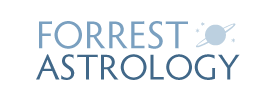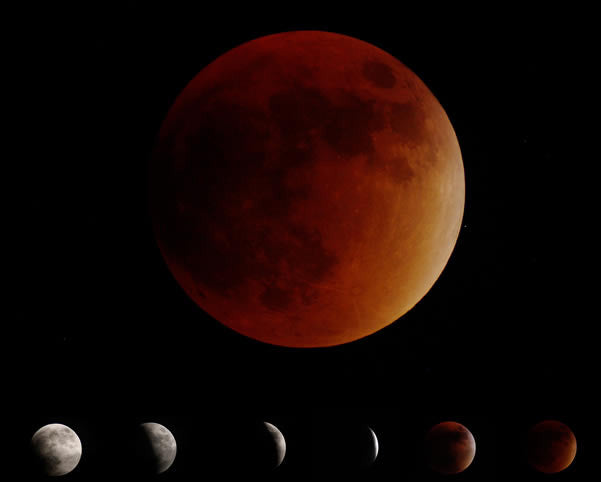Lunar Eclipse July 2009
First, a review of the full Moon: Remember that the Moon rules the ocean’s tides, and that water is a primordial symbol of feeling. Everyone’s emotional “tides” are running higher (or lower) during a full Moon. This effect is more emphasized if you have a Cancer Sun, Moon or Ascendant, or a full or new Moon natally, or the Moon in an angular house natally. Try to give everyone a bit more compassion and understanding, and remember that they (and you) are more subjective under the full Moon.
If the transiting full Moon falls within about 4 degrees of a conjunction OR an opposition to one of your natal planets, then how you express that planet *vis-a-vis other people* is lunarized for the two lunar months before and after that full Moon. The month before the full Moon is probably felt more strongly, and the month after involves more reflection and processing.
Intro to Lunar Phases in the Birthchart
 Perhaps the most obvious lunar phenomenon is the monthly cycle of phases, but it is curiously marginalized in astrological practice. How is a Full Moon in Gemini different from a crescent Moon there? What about waxing versus waning? This lecture introduces an eight-phase interpretation of the lunar phase cycle based on The Book of the Moon.
Perhaps the most obvious lunar phenomenon is the monthly cycle of phases, but it is curiously marginalized in astrological practice. How is a Full Moon in Gemini different from a crescent Moon there? What about waxing versus waning? This lecture introduces an eight-phase interpretation of the lunar phase cycle based on The Book of the Moon.
Full Moons are a transiting Sun-Moon opposition, and the opposition is an aspect of *relationship*. Maybe that relationship is a disagreement, a polarization, a negotiation, or an attraction (there’s deep astrological truth in the saying “opposites attract”!). In any case, something about how you express that planet in the outside world is lunarized and brought to your attention. How do you feel about how you express that planet, AND how do others feel about how you express it?
Without getting into the astronomy of lunar eclipses, think of their astrological interpretation as something like a full Moon on steroids… An eclipse blocks the light of the full Moon from reaching us during the duration of the eclipse. It’s as if the Moon blinks slowly off and on. The relationship between the Sun and the Moon — ego and feelings, head and heart, yang and yin, who and where you are on your own hero’s / heroine’s journey, and what you feel — blinks slowly off and on, too. We all feel this emphasized polarity, and feel our emotional tides running extra high. If you have natal planets within about 4 degrees of the 15 degree Cancer/Capricorn axis, and to some extent within about 4 degrees of the15 degree Aries/Libra axis that squares the Cancer/Capricorn axis, then those planets of yours are particularly sensitized to this eclipse. Oppositions, as an aspect of relationship, call for an *integration* of the solar and lunar principles, or a reintegration, or a new chapter in their ongoing dialogue with one another. Whatever natal planet this eclipse may be affecting in your chart will feel both more *empowered and noticeable and intent on its own agenda* (solarized) for the lunar month before and after the eclipse, and also more *subjective, intuitive, emotional and as if it must heed your feelings* (lunarized) during the lunar month before and after the eclipse. Also, you’ll be brought face to face with how your current expresson of this planet *affects others and is seen by others in the outside world* (full Moon).
To simplify: where the eclipse touches you, *feel who you are* (Moon affects Sun). And *let your actions and who you are becoming take stock of your feelings* (Sun affects Moon).
Wherever you’ll be early Tuesday morning, if you can, wake up, stretch, and go outside if possible, to sit quietly and see and feel the eclipse at work above you and within you.
Peace,
–Jodie
Related Downloads
Lunar Phases Workshop

A complete astrology workshop with Steven Forrest on the Lunar Phase system outlined in The Book of the Moon. Perhaps the most obvious lunar phenomenon is the monthly cycle of phases, but it is curiously marginalized in astrological practice. How is a Full Moon in Gemini different from a crescent Moon in the same sign? What about waxing versus waning? Based on Steven's latest work, The Book of the Moon, this lecture introduces an eight-phase interpretation of the lunar cycle based on the Pagan calendar of solstices, equinoxes, and cross-quarter days.
The Book of the Moon: Discovering Astrology’s Lost Dimension
 To follow the Moon down into our hearts is a journey into another reality, the interior psychic world, where our souls collide with ghosts from our past. Intuition, the Mother, Family, Healing and being healed - these are all lunar topics. The story unfolds against a shifting backdrop of epochal changes in our cultural relationship to what we were foolishly taught to call “the Feminine,” forgetting that men have Moons too!
To follow the Moon down into our hearts is a journey into another reality, the interior psychic world, where our souls collide with ghosts from our past. Intuition, the Mother, Family, Healing and being healed - these are all lunar topics. The story unfolds against a shifting backdrop of epochal changes in our cultural relationship to what we were foolishly taught to call “the Feminine,” forgetting that men have Moons too!Steven's newest book takes a fresh look at the moon, including new insight into the moon's phases, the moon's declination and the "out of bounds" moon.

